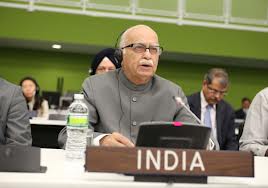
United Nations, October 10: The UPA government that has been facing brickbats from the opposition parties has got a compliment from BJP leader L K Advani for its flagship programme, MGNREGA, which he said has helped empower rural people and revive economic growth.
Mahatma Gandhi National Rural Employment Guarantee Act (MGNREGA), enacted in August 2005, has been touted as a flagship programme by the UPA government.
Advani said the scheme is the largest cash for work programme in the world and responds to the needs of 53 million poor rural households by ensuring 100 days employment to them per year with at least 50 per cent of the work reserved for women.
"This programme has helped break down social inequalities, empower rural people, build up rural infrastructure and revive economic growth," Advani said during his address on 'Social Development' at the General Debate in the Third Committee, which focusses on social, humanitarian and cultural affairs, at the 67th session of the UN General Assembly here yesterday.
Advani is part of a group of visiting Indian parliamentarians who will be participating in various sessions of the General Assembly.
He listed efforts made by India to help women and vulnerable groups, particularly in rural areas, initiatives in the field of education, health interventions and programmes to assist persons with disabilities.
He said in India, achieving inclusive growth underpinned by empowerment of people, especially women, good governance, and investments in social sectors, education and health, skills training, affordable housing, are a major focus.
Given that 65 per cent of India's population lives in rural areas, special emphasis has been placed on rural development initiatives, he added.






Comments
Add new comment